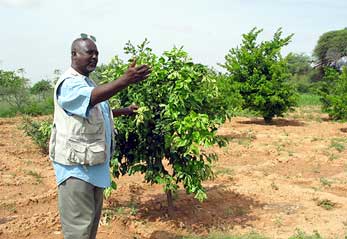UNHCR resumes repatriation from Kenya to Somalia's Puntland
UNHCR resumes repatriation from Kenya to Somalia's Puntland

Note: This story was slightly amended on July 24 to reflect a delay in the "go-and-see" visit
BOSSASO, Somalia, July 21 (UNHCR) - The UN refugee agency has resumed the repatriation of Somali refugees from Kenya's Dadaab camp while trying to build more confidence for further returns to Puntland in north-eastern Somalia.
More than 80 Somali refugees have left Dadaab camp since Saturday (July 19), when UNHCR resumed its return operation to Puntland. The last movement was in May, when 534 Somali refugees flew back to their homeland after more than a decade in exile. The voluntary repatriation had been suspended for two months due to a lack of funds for the flights. Repatriation is only possible by air because it is not safe to travel by road in large parts of central and southern Somalia, on the route from Dadaab to Puntland.
A total of 2,880 Somali refugees have signed up for voluntary return, and UNHCR has been trying to encourage more people to follow through "go-and-see" visits to Puntland, an economically vibrant part of Somalia that many of the refugees have not seen before.
Even those whose parents or grandparents came from Puntland are not familiar with the boom that has transformed the area's economic and physical landscape. Puntland's economic development is being fuelled by former refugees who are bringing their education, money and business skills home after years spent in Canada, the United States or Western Europe.
To allow Dadaab's Somali refugees to make informed decisions about the possibility of settling in now-peaceful Puntland, UNHCR is planning to take refugee leaders on a three-day visit to Bossaso, Puntland's economic centre; to Garowe, the capital; and to Galkayo, another booming city. They will report their impressions and experiences to Somali refugees in Dadaab.
There is no substitute for seeing Puntland's progress in person, said Simone Wolken, UNHCR representative for Somalia.
"Much as we admire the communication system that exists among the Somali people from inside Somalia to every corner of the world, there is always a difference between receiving oral information and seeing it with your own eyes," she said. It will be important, she added, for the refugees on the "go-and-see" mission to have a chance to interact with people living in Puntland, most of whom are former refugees themselves.
"UNHCR wants refugees to make truly informed decisions," Wolken said. "They need to know what to expect and how to prepare while still in exile. Meeting the people in Puntland will help the refugees to make a realistic decision" about whether to accept UNHCR's offer of help to settle in Puntland.
In Bossaso, the refugee leaders will be met by the mayor, who will show them the bustling local market as well as the busy port on the shores of the Gulf of Aden that forms the gateway to lucrative trade with Arab countries. In both Bossaso and Galkayo, they will see evidence everywhere of the construction boom that is transforming once-sleeping cities into thriving hubs.
Along the drive from Bossaso to Galkayo, the refugees will also visit projects that benefit returnees. In Gardo town, for example, they will visit a brand new covered market hall (constructed with UNHCR funding) where vendors will be able to sell meat and vegetables in more sanitary conditions than by the side of the main road, as they have been doing.
"This is a very big stride forward," said Dahir Mohamed Ismail, an economist in Gardo and consultant to one of UNHCR's partners. "This project is important not only because it moves the vendors from the dirty area to a more hygienic place. It's also important because UNHCR was the first agency to come back to Gardo," the scene of inter-clan fighting during the last two years.
"UNHCR has opened the door," he continued. "I think that will attract many other donors to invest in improvement and rehabilitation efforts."







